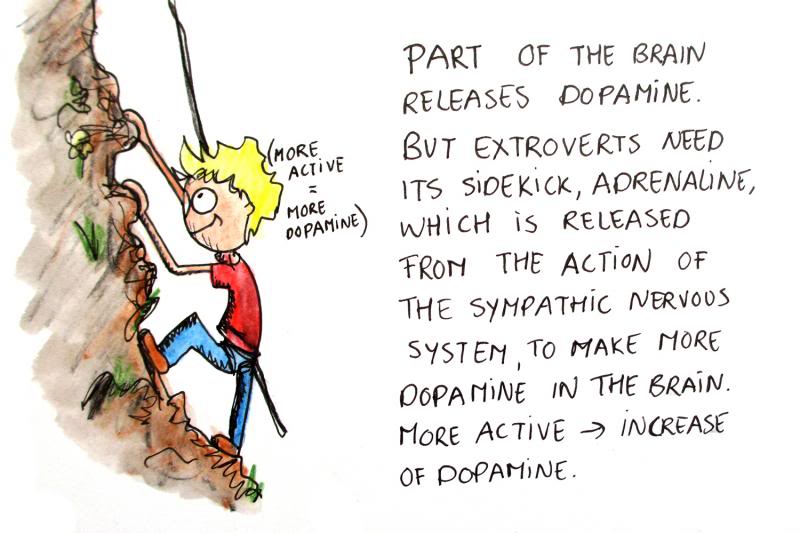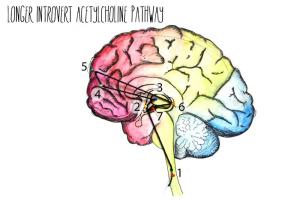 Ever wonder why some people require thrills and action in order to get engaged in life while others are content reading a book, listening to music or staring at artwork?
Ever wonder why some people require thrills and action in order to get engaged in life while others are content reading a book, listening to music or staring at artwork?
What physiologically makes an introvert an introvert and an extrovert an extrovert?
There is more to the introvert/extrovert comparison than how each one socializes.
It’s in your genes
According to Dr. Marti Olsen Laney in The Introvert Advantage, there has been sufficient research done on the ‘novelty seeking’ gene, D4DR. Although no one gene determines temperament, D4DR is found on the 11th chromosome which has been deemed the personality chromosome by British journalist and member of the House of Lords, Matt Ridley, because of its influence on behavior, particularly exhilaration and excitement. Thrill seekers (extreme extroverts according to Dr. Marti Olsen Laney of The Introvert Advantage) examined in geneticist Dr. Dean Hamer’s study were shown to have a long D4DR gene and were less sensitive to the neurotransmitter dopamine. Those participants with more reflective and slower paced natures had shorter D4DR genes and a higher sensitivity to dopamine.
Dopamine: The want, desire, seek out and search neurotransmitter
According to the 2012 Psychology Today article titled, Why We’re All Addicted to Texts, Twitter and Google, the neurotransmitter, dopamine, was discovered in Sweden in 1958. It is created in various parts of the brain and is involved in such brain functions as thinking, moving, sleeping, mood, attention, motivation, seeking and reward.
Most people think of dopamine as the pleasure or reward brain chemical but recent research states that those attributes are more strongly correlated with the opioid system in the body. Dopamine is the neurotransmitter that makes us want, desire, seek out and search. It increases our level of arousal and goal-directed behavior. It motivates us to move, learn and survive. Not only does dopamine move us regarding physical needs such as food and sex but it also makes us curious about abstract concepts such as ideas and information.
The extroverted brain
Advances in brain technology such as PET scans and MRIs have given us a peek inside the brains of extroverted and introverted individuals (determined by questionnaires filled out prior to participation in the scans). Such scans note where blood flows in the brain.
During a study conducted by Dr. Debra Johnson and reported in The American Journal of Psychiatry, it was discovered that extroverts’ blood flowed in shorter (why they can process faster and speak off the cuff) pathways toward parts of the brain where visual, auditory, touch and taste are processed, in other words, where external stimulation (other than smell) is processed.
Another point uncovered during brain imaging studies was that the neuro-pathways most used by extroverts are activated by dopamine. Those participants with an ability to process a higher amount of external stimuli and a novelty seeking personality (extreme extroverts) were less sensitive to dopamine.
So how do they get the dopamine their neuro-pathways need? They enlist the help of adrenaline, which is released in the sympathetic nervous system, to make more dopamine. The more active the extrovert is the more adrenaline is produced and dopamine increases.
Extroverts feel good when they have places to go and people to see. — Dr. Marti Olsen Laney, The Introvert Advantage
The introverted brain
Introverts’ brains work differently than extroverts’. For one thing, introverts have more blood flow to their brains than extroverts. According to Marti Olsen Laney, that indicates more internal
stimulation and sensitivity. The blood in an introvert’s brain travels longer, more complicated pathways and focuses on parts of the brain involved with internal experiences like remembering, solving problems and planning.
Introverts’ brains still use dopamine but are more sensitive to it and too much of it will cause over-stimulation. The more dominant neurotransmitter found in the introvert’s neuro-pathways is acetylcholine. Acetylcholine affects attention and learning, influences the ability to stay calm and alert, utilizes long-term memory and activates voluntary movement. Not surprisingly, acetylcholine stimulates a good feeling when we think and feel.
Acetylcholine acts as an inhibitory neurotransmitter when it activates our parasympathetic nervous system, which helps us calm down and conserve energy when stimulated. The sympathetic nervous system (fight or flight) has the opposite effect. It is characterized by activity and mobility and employed more by the extroverted brain.
The science geek in me ponders this…
The recent studies regarding dopamine as a seeking and searching chemical versus a reward chemical makes me wonder about the introvert’s sensitivity to it. The fact that it stimulates curiosity (seeking and searching) about ideas and information (which seems like internal work) makes it seem like the ideal and probable chemical behind our love of internet surfing and research. Could this be an introvert’s way of mitigating and applying dopamine (being active?) without over-stimulating ourselves? Could our brain chemistry/physiology be changing because of the internet? Just a couple of questions that came up as I did the research.
Thank you for allowing me to entertain my science mind. I’ve always had a fascination with neuroscience, biology and anatomy.
Have you noticed your penchant as an introvert to ‘throttle down’ more than ‘rev up the engine’? Do you prefer more active tasks or more reflective? What did you learn from this post?
If you enjoyed this more scientific post, you may also enjoy:
How to Protect and Liberate Your Energy:A Guide for Introverts and Anyone Who Feels Drained
How to Remedy Anxiety and Stress When You’re an Introverted Feeling Type
There’s Nothing Wrong with You. You’re an Introvert.










[…] a sensitive introvert and INFP personality type, the non-stop action and endless decision-making wore me out. I needed positive energy inflow and a stoppage of outflow. […]
[…] some of these traits can be explained, at least in part, by the way our introvert brains work. Our brains prefer to run on the longer acetylcholine (a neurotransmitter) pathway, which tends to […]
[…] hate being over-stimulated. And it happens easily. Our brain chemistry is different, so the noisy, adrenalin-pumping activities that make others euphoric can make us feel miserable. […]
Great information. IMO, I have noticed that society is turning more introverted with the onset of technology and everyone having instant access to this vast information that we process internally, yet it connects us to so many in this intimate way though we don’t even meet in person. There’s less of a filter with what people share online it seems than what is acceptable to say in person or out loud, and so we take all of this in quietly but we see the outcome affecting all of us. I think we’re starting to look more within than without. It will be neat to see how we evolve and change as a result.
Very interesting comment on our evolving culture. I agree. We are more uninhibited online. It is a great outlet for our feelings, shadow behavior, spirituality and worrisome thoughts. It could be nudging us all (extroverts and introverts) toward our inner world.
I thought you were going to say society is turning everyone more introverted because technology allows us constantly to be connected/reached. Even extroverts are getting burned out from interacting. I believe there is that happening as well. I know many extroverts who are zapped by the end of the day because of the constant requirement to be ON. Technology gives us the ability to do more and we’re supposed to heed that ability.
I will ponder your comment for a while. Thanks for making me think.:)
I might be a bit more nuanced in my personal reality. Love calm away from work, and thrive on action/adrenaline at work (in comfort zone)…great post as always Brenda. You leave me thinking.
What Myers Briggs type are you David? You definitely are a dichotomy. I’ve always been in awe of the contrast between your day job and your writing/posting on Live and Learn. You seem comfortable and adept in both arenas. Thanks for reading and sharing your insight. 🙂
Thank you for the kind words Brenda. When I first took the test, I landed as a ISTJ. I took it again last night and I’ve moved to ISFJ (w “Turbulent” variant) using the Free Personality Test @ 16 Personalities. I believe they have nailed my profile again. I like the test this group has produced. If you or others are interested, you can find link on post: http://davidkanigan.com/2014/11/21/who-are-you-in-stressful-situations/
I read that post on your site but didn’t see what type you landed on. ISFJ makes sense. The switch from a T to an F shows your people/values facet has developed even further. Often there is one function or letter that changes when you retake the test. That just means you have close to equal preferences for each one or you are thinking of yourself in different roles when you take it or you have developed one function significantly on your journey to become whole. ISFJs like to be of service. Nurses and doctors are often ISFJs.
Fascinating. An aha moment for me Brenda. You have opened my eyes to something that inherently know turned in me, but couldn’t put a finger on it. Entering middle age, the climb up the ladder was less important than helping others. While not in nursing or medicine, I do find myself to be in service to my team. Thank you for your insight. This was an important finding for me.
According to Carl Jung and Myers-Briggs, around mid-life most of us work on our less developed functions in order to become more whole, in order to be better equipped in all situations. I’m sure you are of great service to your team.
Awareness is fun, isn’t it? 🙂
Brenda, interesting article on this topic in WSJ today. Thought you would enjoy it. An excerpt:
These “biogenic” personality traits are not, as William James thought, set in plaster. “I think we humans are essentially half-plastered,” Mr. Little writes, because we also have “free traits,” which explains why we often act “out of character.” Personality has “both an inner and an outer reality,” which is why, like Mr. Little, we can feel that we are introverted but give a smashing lecture anyway. We can be tough, mean and disagreeable at work and make an effort to be kind, thoughtful and tender toward relatives at a holiday dinner. Which is the real “us”? We are both. “We enact free traits out of professionalism and out of love,” he says. Social psychologists like myself would add: “. . . and out of the demands, constraints and opportunities of the situations we’re in.”
Check out full story here: https://twitter.com/davidkanigan/status/536207861714395137
I could not get to the full article on WSJ even though I logged in through Facebook. I have read other articles involving Brian Little. He worked with Susan Cain on Quiet and mentioned his free trait theory there. I remember him saying we are especially adept at going outside our comfort zone or acting out of character for things we consider meaningful work. I may have to buy his book. Thanks for sharing with me David. Fascinating.